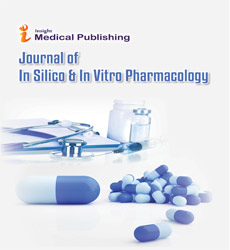Human immunology and immunotherapy: main achievements and challenges
Andriya Taylor
Andriya Taylor*
Managing editor, In Silico & In Vitro Pharmacology, London, UK
- *Corresponding Author:
- Andriya Taylor
Managing editor
In Silico & In Vitro Pharmacology
London, UK
E-mail: Taylor444@ Hotmail.com
Received Date: May 05, 2021; Accepted Date: May 19, 2021; Published Date: May 26, 2021
Citation: Taylor A (2021) Human Immunology and Immunotherapy: Main Achievements and Challenges. In Silico In Vitro Pharmacol Vol.7 No.3:2.
Abstract
The development of several types of immunotherapies, such as vaccinations (both preventative and therapeutic), pathogens, monoclonal antibodies, recombinant proteins, cytokines, and cellular immunotherapies, is transforming how we approach many diseases, including cancer. The immune system is a complex universe of interconnected cells, soluble factors, interacting cells, and tissues. The immune system's complexity makes it difficult to see it as a whole, but researchers are now attempting to piece together all the puzzle pieces to gain a full picture. We are beginning to comprehend the various types of cell subsets, soluble factors, membrane molecules, and cell functions, as well as their involvement in health, ageing, and illness. Many gaps are being filled, and in some cases, previous assumptions have been challenged. For example, adaptive immune cells were previously thought to be unique memory cells until trained innate immunity was discovered, and several innate immune cells with features similar to those of cytokine-secreting T cells have been discovered.
Introduction
Although the immune system is incredibly complex, new tools and abilities are being developed to study it. The discovery of thousands of distinct monoclonal antibodies that allow the identification of a wide variety of cell subpopulations and the functional study of immune cells is one of the most important reasons in these breakthroughs. In various disorders, research into the interplay of the immune system with other systems, such as the neurological and endocrine systems, or the microbiome, has yielded intriguing insights with substantial clinical implications.
Interaction of the immune system and the microbiome
In the presence of commensal bacteria that invade the barrier surfaces of vertebrates and invertebrates, the immune system has evolved. The interaction between the natural host microbiome and the immune system is especially fascinating in the gastrointestinal tract, where the density and diversity of indigenous bacteria, viruses, and fungi is highest compared to other anatomical regions. The improved characterisation of some immune cell subsets, trained immunity, and host-microbiome interactions are only a few instances of immunology's development in recent decades. Understanding human immunology will take more effort if we wish to fully leverage the immune system's capabilities for human health. Immunologists have created a number of techniques and technologies in collaboration with specialists from other domains to obtain higher selectivity in the identification and analysis of human cell subsets, kinds of cytokines and receptors, chemokine, and other molecules. These tools span from next-generation sequencing, mass spectrometry, and bioinformatics-based biological approaches to multipara meter flow cytometer and single-cell gene expression analysisbased immune monitoring technologies. These strategies provide a considerably better image of the entire immune system than individual and independent approaches, despite their limitations.
Auto-inflammatory diseases
Recurring acute inflammatory episodes secondary to a deregulated inflammatory process that often occurs during childhood, with recurrent episodes of fever, rashes, and diseasespecific patterns of organ inflammation, are characterised by systemic Auto Inflammatory Disorders (AIDs). The inflammasome is a multiprotein intracellular complex that recognises pathogenic bacteria and stresses and activates the cytokines IL-1 and IL-18, which are extremely pro-inflammatory. Ubiquitination is a process that marks proteins for breakdown by the proteasome, which is necessary for the processing and presentation of intracellular antigens (such as viral proteins or altered tumour proteins) by class I HLA molecules. Ubiquitination is divided into three steps: activation, conjugation, and ligation, all of which are carried out by ubiquitin-activating enzymes (E1s), ubiquitin-conjugating enzymes (E2s), and ubiquitin ligases, respectively (E3s).
Immunotherapy
Immunotherapy refers to the use of immune system components (antibodies, cells, cytokines, and so on) to treat malignancies and autoimmune disorders, as well as the manipulation of the immune system through vaccinations to prevent and treat infectious and allergic diseases. Immunotherapy can be used for a variety of disorders (infections, autoimmune diseases, macular degeneration, allergic diseases, and so on), but it is most commonly utilised in the field of cancer. The fundamental goal is to eliminate the tumour, either directly or indirectly, with more specificity and fewer side effects than traditional therapy.
Conclusion
Greater understanding of the immune system, particularly the diversity of cellular and humoral components and the close regulation among them, as well as the interaction with other systems or elements such as the micro biota, will enable the development of new types of therapies that may be safer, more effective, and specific while posing far less toxicity than currently available therapies.
Open Access Journals
- Aquaculture & Veterinary Science
- Chemistry & Chemical Sciences
- Clinical Sciences
- Engineering
- General Science
- Genetics & Molecular Biology
- Health Care & Nursing
- Immunology & Microbiology
- Materials Science
- Mathematics & Physics
- Medical Sciences
- Neurology & Psychiatry
- Oncology & Cancer Science
- Pharmaceutical Sciences
